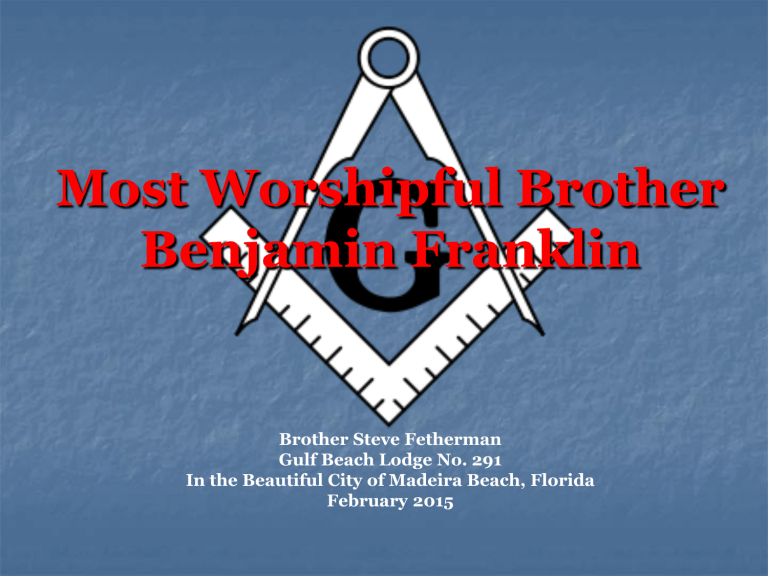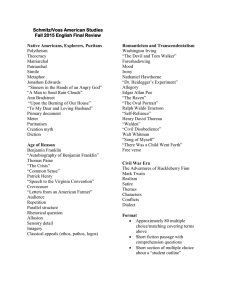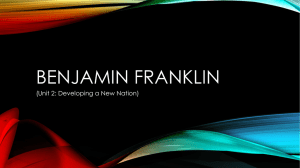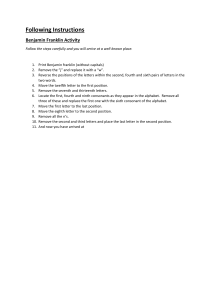Benjamin Franklin: Life, Achievements & Freemasonry
advertisement

Most Worshipful Brother Benjamin Franklin Brother Steve Fetherman Gulf Beach Lodge No. 291 In the Beautiful City of Madeira Beach, Florida February 2015 Brother Benjamin Franklin Interpretation Disclaimer As not to offend any of the Brethren's Sensitivities, the following Disclaimer is offered: This is the Presenter's Interpretation on Benjamin Franklin and neither represents the views, opinions, policies, or official positions of Gulf Beach Lodge No. 291, the Grand Lodge of Florida or any other Masonic Institution. It is the summation of the academic and historical research and analysis of the presenter. Brother Benjamin Franklin Benjamin Franklin was a World Renowned Polymath* in his own Time Printer Intellect Newspaper Man Leading Author Librarian Politician Postmaster Scientist Inventor Philosopher Civic Activist Statesman Diplomat American Patriot and Founding Father Master Mason, Worshipful Master, and Grand Master *Polymath is a person of exceptional talent in more than one professional field or career… Brother Benjamin Franklin Early Life - Boston 17 January 1706 Benjamin Franklin was born in a house on Milk Street One of Ten Children born to Joshua and Abiah Franklin Received part of his education at Boston Latin School (HS) His Father ran short of money, he was removed from Boston Latin, and he was self taught from age nine His Mother wanted him to go into the Clergy, but Benjamin had other ideas At Age 12 he became an Apprentice Printer to his older brother James In the next three years he would become a master printer and columnist for James’ newspaper – The Boston Courant The Boston Courant was the first independent newspaper in the Colonies Brother Benjamin Franklin Early Life - Boston At the age of 15 he adopted the pseudonym of “Mrs. Silence Dogood,” a middle-aged widow and wrote a series of letters to his brother’s newspaper “Mrs. Silence Dogood” would make social, political, and common sense observations on the governing and happenings in and around Boston. “Mrs. Silence Dogood” became the most popular column and the talk of the town in Boston, very popular in other America Colonial cities, and helped make The Boston Courant a success 1722 James was arrested for Sedition for publishing uncomplimentary article about Massachusetts Governor Samuel Shute With his brother James’ Arrest and at 16 Ben took over the Paper, shortly there after Mrs. Dogood wrote: “Without freedom of thought there can be no such thing as wisdom and no such thing as public liberty without freedom of speech.” Shute ordered Benjamin’s Arrested, he fled the Colony Brother James was released from jail and Benjamin Franklin became a fugitive Brother Benjamin Franklin Early Life - Philadelphia At the age of 17 he arrived in Philadelphia (1723) He worked for a number of Printers as a typesetter His Mrs. Silence Dogood articles made him new friends in Philadelphia PA Governor Sir William Keith, a fan of Mrs. Dogood’s, convinced him to go to London, buy his own printing equipment, and open is own printing shop and newspaper In 1726 Franklin returned to Philadelphia to open his print shop and newspaper with partner Thomas Denham Brother Benjamin Franklin Franklin the Printer Franklin’s first success was as a printer Franklin became the Pennsylvania Assembly Recorder (Secretary) and with this got his first series of printing jobs, printing the PA Assembly Records, Minutes, Laws, Edicts, Stamps, and Currency He and his partner Thomas Denham forged a successful business Brother Benjamin Franklin Franklin the Newspaperman With his printing partner’s death in 1728, Franklin focused on the printing business & started the Philadelphia Gazette. The Philadelphia Gazette became the New York Times of his day, with readers in every colony and Europe 1731 Franklin set up the first woman printer in America. The widow of his partner of the Charleston Gazette who he maintained a partnership with for 30 years until her son sold business in 1761 In 1732, Franklin started the first German language Newspaper in Philadelphia - Die Philadelphische Zeitung Franklin was the William Randolph Hurst of his day, he had newspaper and printing partners from Boston to Barbados. By the age of 42, 1748, he sold off his Newspaper Empire to devote more time to his research and academic endeavors. He retained a share of the profits from each of these printing & newspaper enterprises to fund the rest of his life Brother Benjamin Franklin Franklin the Leading Author In 1732, Franklin began to publish Poor Richard’s Almanack Again written under a pseudonym Richard Saunders and it was no secret that Franklin was the author Poor Richard’s Almanack became the most popular publication in the American Colonies for more than 26 years until he stopped publication in 1758 Famous among it’s content was “Poor Richard’s Proverbs:” A penny saved is a penny earned Fish and house guests stink in three days Never put off until tomorrow what you can do today Poor Richard’s had a circulation of 10,000 at it’s peak when America had a population of ~1.2 million people. In modern 21st century numbers that would be a circulation 3 million and would out sell every modern magazine circulation Brother Benjamin Franklin Franklin the Leading Author 1741, Franklin began publishing The General Magazine and Historical Chronicle For All The British Plantations in America, a monthly magazine on American agriculture His subscribers included Thomas Jefferson, George Washington, Daniel Custis… 1758, Franklin began writing “Father Abraham’s Sermons” that turned out to be his Autobiography Brother Benjamin Franklin Franklin the Intellect Franklin developed a decision making check list or process for a friend Joseph Priestly, the technique today is called the “Pro and Con List” Franklin was an avid Chess player, by 1733 at the age of 27 he was among the notable Chess Players in the Colonies. Chess players traveled from all over the colonies, French and British Canada, and the Caribbean to sit in Tun Tavern and play chess with Franklin In 1786, he published an essay in the world’s leading chess journal Columbian – “The Morals of Chess.” This was circulated world wide. In 1999, Franklin was inducted into the US Chess Hall of Fame Brother Benjamin Franklin Franklin the Librarian In 1727, at the age of 21, Franklin started “Junto” a group of like minded young men with an interest in Books Books, especially good books, were rare in Colonial America, many wealthy people had small personal libraries, middle class and poor people did not have ready access to books of any kind as they were rare and expensive in the Colonial America. There were no Public Libraries Junto turned into a private library, books being supplied by the members, who checked out books from the members’ collection 1732, Franklin started The Library Company of Philadelphia and he hired the America’s first Librarian – Louis Timothee For the first years the books were kept in Timothee’s home 1739 the Junto collection was moved to the 2nd Floor of Pennsylvania State House – now called Independence Hall The Library Company of Philadelphia grew into the first Public Library, Franklin and his fellow Junto Members funded and operated this first public library without governmental support Today the Junto Collection consists of: A half million rare books & pamphlets 150,000 manuscripts 75,000 graphic illustrations The Library Company of Philadelphia became the model Franklin and Washington would later use to establish the Public Library System in the United States Brother Benjamin Franklin Franklin the Inventor Franklin was a prodigious Inventor: Lightning Rod from his work in electricity Glass Armorica, musical instrument of 13 spinning crystal bowls played with wet finger tips Bifocal Glasses Flexible Urinary Catheter Franklin Stove, the standard in colonial home and business heating systems 1736, as a printer of Pennsylvania currency he developed and printed a public pamphlet to help indentify forged currency and those techniques to water and ink mark paper currency Franklin never filed a patent He shared the plans with anyone Brother Benjamin Franklin Franklin the Scientist Franklin advanced a number of Sciences: Demography – Observations on the Increase of Mankind (1755) is still used as reference today Ocean Currents - as Post Master, Franklin researched the means to speed up Atlantic mail delivery. Interviewing Nantucket whaling captains he learned of the current running south to north along the Atlantic seaboard then east across the Atlantic. Franklin charted this information, named the current Gulf Stream, and sped up mail delivery Electricity His research lead to discovery of Positive and Negative charge, and concept of holding a charge in a capacitance device. Franklin’s work electrical conductivity has been cited by Michael Faraday as the basis of his work Worked to develop techniques for refrigeration Naval Architecture and Oceanography Catamaran Hull designs Water tight compartments Sea Anchors Brother Benjamin Franklin Franklin the Philosopher In 1726, at the age of 20 Franklin developed his Thirteen Virtues: 1. 2. 3. 4. 5. 6. 7. 8. 9. 10. 11. 12. 13. Temperance Silence Order Resolution Frugality Industry Sincerity Justice Moderation Cleanliness Tranquility Chastity Humility Franklin was an advocate of republicanism that emphasized the new republic could not survive without virtuous people Virtue for republicans like Washington and Franklin came from “divine providence,” without Godly virtues the republic would not survive Brother Benjamin Franklin Franklin The Politician 1724 he was appointed as Recorder or Secretary of the Pennsylvania Assembly 1748 he was elected a Philadelphia City Councilmen 1751 he was elected to the Pennsylvania Assembly Between 1757 and 1775 Franklin was the Pennsylvania Assembly’s representative in England protesting the Stamp and Tax Acts 18 October 1785 Franklin is elected as the President of Pennsylvania, i.e., the State Governor, he served one term and stepped down on 5 November 1788 at the age of 82 Brother Benjamin Franklin Franklin The Statesman and Diplomat Following the French and Indian War the British Parliament passed a series of taxes extremely unpopular in the colonies, Franklin spent many months in England and Europe working to over turn these taxes Franklin self taught himself French, Spanish, and Dutch Between 1776 and 1785 Franklin held the post of United States Ambassador to France 1778 Franklin secured the alliance between France and the United States that turned the ride of events during the American Revolution Franklin argued the case of Religious Freedom to the King Louis XVI Courts and Philosophers resulting in the Edict of Versailles returning rights and citizenship to all non-Catholics Brother Benjamin Franklin Franklin The Postmaster 1753 the British Prime Minster appointed him Post Master General of North America As Post Master of the American Colonies Franklin made the mail so efficient a letter in his day traveled from Philadelphia to Boston faster than it does today. Franklin innovated the over seas mail to Europe and Britain reducing delivery times by 50% Franklin held this Post until 26 July 1775 26 July 1775, the Second Continental Congress establishes the United Postal Service & names Franklin the first Post Master General of the United States Brother Benjamin Franklin Franklin the Academic – the Great Believer in Self Improvement 1743 he started The Academy, Charity School, and College of Philadelphia The College of Philadelphia was the first non-Religious College in America The College of Philadelphia was the first “Public University” in America The Academy was the first public school and is the basis for our public education system today The Academy was the first public school in the world – “A Liberal Education.” The Charity School would become the first free public primary and secondary school for poor children in America Between 1750 and 1753 Dr. Benjamin Franklin, Dr Samuel Johnston, and Dr William Smith developed a new structure for colleges focused on professions. Johnson went on to found King’s College (Columbia University) in New York for law and medicine Franklin and Smith established The College Philadelphia for other professional disciplines. Brother Benjamin Franklin Franklin the Academic – the Great Believer in Self Improvement The College of Philadelphia would become the University of Pennsylvania “The College” Franklin and Smith began educated many professionals in the Colonies One third of the men who sat in the Continental Congress and contributed to the Declaration of Impendence were students at “The College” and “The Academy” at one time or another Franklin was awarded honorary Doctorate Degrees from Oxford, Cambridge, Harvard, and Yale Universities in the disciplines of Medicine, Science, and Philosophy For the Remainder of his life many people referred to him as “Dr. Franklin.” Brother Benjamin Franklin Franklin The Civic Activist In 1736, Franklin started the Union Fire Company, the first volunteer fire fighting company in America 1747 he founded the American Philosophical Society to assist fellow inventors and scientists to discuss and further their ideas 1749 he became a Justice of the Peace 1756, during the French and Indian War Franklin organized the Philadelphia Militia – The Associated Regiments of Philadelphia consisting of the 103rd Artillery and 111th Infantry Regiments of the Royal Continental Army. He was elected Commander and declined the command because of his age. He recruited at Tun’s Tavern the home of his Masonic Lodge – St. John’s Lodge and the birth place of the Marine Corps 1756 Franklin he became a prominent member of the Society for the Encouragement of the Arts, Manufactures, and Commerce which gave businessmen a venue to discuss their profession Brother Benjamin Franklin Franklin The Medical Doctor 1751 he helped establish the Pennsylvania Hospital in Philadelphia the first hospital in America Franklin worked on and invented multiple medical procedures and apparatus – flexible catheter, improved stethoscope Many of the Doctors for this Hospital were educated by his friend Dr Samuel Johnston at King’s College in New York City He developed and made bifocal glasses Brother Benjamin Franklin Founding Father After returning from his first mission to England in 1762 Franklin worked in support of the Pontiac Rebellion in Western Pennsylvania In May 1775, shortly after returning from his second mission to England Franklin was elected as one of the three PA Representatives to the Continental Congress The same month Franklin was critical in the appointment of George Washington as Commanding General of the Continental Army As a member of the Continental Congress Maritime Committee: He participates in the drafting the resolution that establishes “Two Battalions of Continental Marines to be formed and manned for the current conflict…” He helps select two of his Lodge Brothers to recruit these battalions of Marines, one is Samuel Nicholas the first Marine Corps Commandant. The recruiting takes place at the old St John’s Masonic Lodge – Tun’s Tavern He writes the policy on “Privateers” He participates in the establishment of the Continental Navy He supports the commissioning of John Paul Jones, American Naval hero and Father of the US Navy Brother Benjamin Franklin Founding Father June 1776 Franklin, with John Adams & Thomas Jefferson, is appointed to “The Committee of Five” to write the Declaration of Independence Signing the Declaration of Independence right after John Hancock, Franklin spoke the immortal words “Yes, we must, indeed, all hang together, or most assuredly we shall all hang separately.“ After returning from France in 1785 Franklin is recognized as an important champion of American Independence, 2nd only to Washington If not for George Washington, Benjamin Franklin would have been our First President If not for his death before the end Washington’s 2nd Term, Franklin would have been President Brother Benjamin Franklin Founding Father 1787 Franklin is appointed to the Constitutional Convention where he vehemently argues for the freedom of black slaves, free speech, and religious Freedom He strongly advocates with James Madison, the author of the Bill of Rights, to includes these Rights in his document During Washington Presidency he works with the POTUS to establish our public education system and funds for public libraries modeled after his earlier work Brother Benjamin Franklin Franklin the Mason 1730 Franklin became a member of Philadelphia’s Saint John’s Lodge Meetings were held on the 2nd Floor of Tun’s Tavern, where Junto Society met and birth place of the United States Marine Corps, later meeting at Independence Hall Freemasonry provided Franklin with a vast array of trustworthy “Brothers” to advance his ideas, form business partnerships, develop a revolution, and establish life long friendships Franklin’s famous Masonic Associates: George Washington Thomas Jefferson Voltaire James Madison Franklin helps establish the American Masonic values of a liberal education prominent in the Fellowcraft Degree Brother Benjamin Franklin Masonic Record of Brother Benjamin Franklin Brother Franklin Masonic Record covers over sixty years of service to the Craft February 1730 Initiated Entered Apprentice at St John’s Lodge Philadelphia August 1730 Passed to Fellow Craft at St John’s Lodge Philadelphia December 1730 Raised to Master Mason at St John’s Lodge Philadelphia December 1731 elected Worshipful Master June 1932 Writes St John’s Lodge By-Laws June 24 1732 Elected Junior Grand Warden Grand Lodge of Pennsylvania June 24 1734 Elected Grand Master of Grand Lodge of Pennsylvania 1734 Lays cornerstone of new St John’s Lodge Building – Independence Hall 1735 St John’s Lodge moves from Tun Tavern to Independence Hall 1735 – 1738 Serves as Secretary of St John’s Lodge June 10 1749 Appointed Provincial Grand Master of Pennsylvania 23 March 1750 Deposed as Provincial Grand Master of Pennsylvania 23 March 1750 Appointed Deputy Grand Master of Pennsylvania 12 March 1752 Appointed as Chairman of Committee to build Grand Lodge building of Pennsylvania Brother Benjamin Franklin October 25 1752 Dedicates the Tun Tavern Lodge Philadelphia 24 June 1755 Participates in the Dedication of the Grand Lodge building of Pennsylvania. First Masonic building in America 24 June 1755 Elected as Grand Master of Pennsylvania, serves until June 1760 1776 Affiliates with Lodge of the Nine Sisters or Muses, Grand Lodge of France 1777 Balloted as member of Lodge of the Nine Sisters March 7 1778 Assisted in the Initiation of Voltaire at Lodge of the Nine Sisters November 28 1778 Presides over Masonic Lodge of Sorrow for Voltaire January 1782 Elected Worshipful Master of Lodge of the Nine Sisters July 7 1782 Elected Member of the Lodge of De Saint Jean De Jerusalem April 24 1785 Elected Worshipful Master of the Lodge of De Saint Jean De Jerusalem April 19 1790 Masonic Lodge of Sorrow for Brother Benjamin Franklin Brother Benjamin Franklin What Franklin loved most Good Books Good company Good Friends Good Masonic Brothers Good Drink and Dinner A Good Conversation with Men of Similar Interests – Junto and Societies Good Female Companion, active in his late 70’s His life’s greatest failure, his relationships with his family – wife and son Brother Benjamin Franklin In Conclusion: Benjamin Franklin was the pure American Genius He is the grand example of the American Entrepreneurial Spirit and Idea He typified through hard work, self improvement, dedication, and self application “The American Dream” He was willing to risk everything and his life for these principles and ideas – “…we must, indeed, all hang together, or most assuredly we shall all hang separately.“ His great successes are a collection of life time successes that any Man would be Proud to Possess One Of all the Founding Fathers he is probably the only one who could and would readily adapt to and be accepted by 21st century America Benjamin Franklin is Perfect Example of the Great American Mason Questions?



